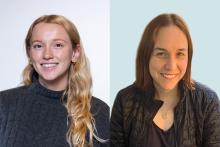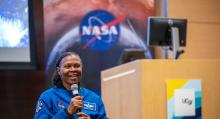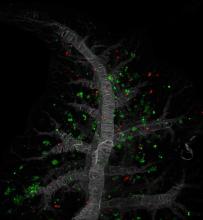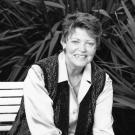News
15 UCSF Researchers Named to First Cohort of Chan Zuckerberg Biohub Investigators
Fifteen UC San Francisco faculty members have been named to the first cohort of Chan Zuckerberg Biohub Investigators. The CZ Biohub is an independent nonprofit research organization formed as a collaboration between UCSF, UC Berkeley and Stanford University with the goal of inventing new tools to
Precision-Medicine Approach Could Revive Prostate Cancer Test
A new study led by researchers at UC San Francisco and Kaiser Permanente has identified genetic predictors of normal prostate-specific antigen (PSA) levels in healthy men, which could be used to improve the accuracy of PSA-based prostate cancer screening tests. Until recently, PSA tests for prostate
'Dense Breasts' Eclipse All Other Known Breast Cancer Risk Factors
Women whose breasts are composed largely of glandular tissue, rather than fat, have an amplified risk of breast cancer, which exceeds the impact of other widely known risks on a population level, including family history of the disease, personal history of benign lesions and first full-term
E-Cigarettes are Expanding Tobacco Product Use Among Youth
E-cigarettes – thought by some to be responsible for a decline in youth cigarette smoking – are actually attracting a new population of adolescents who might not otherwise have smoked tobacco products, according to a new UC San Francisco study. In the first national analysis of the impact of e
Successful Immunotherapy Requires System-Wide Immune Response
New research led by researchers from UC San Francisco and Stanford University has found that successful cancer immunotherapy appears to depend on whether the treatment can trigger a system-wide immune response, rather than just a local response within the tumor itself. Specifically, data from both
Vapers beware: 10 things to know about e-cigarettes
With catchy names like Smurf Cake and Unicorn Puke and sweet flavors like bubble gum and strawberry, electronic cigarettes may have special appeal to young people, but that doesn’t mean they are safe. Evidence is mounting that e-cigarettes are exposing a new generation to nicotine addiction and may
Largest-Ever Gift to UCSF Honors Philanthropist Helen Diller
To honor and build on a lifetime of giving and charitable service by the late Helen Diller, the Helen Diller Foundation has granted $500 million to UC San Francisco, a university to which Helen was both generous and devoted. The gift will be the largest single donation in UCSF’s history and one of








